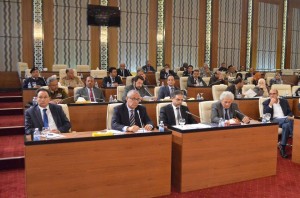By Osama Matri
Tripoli, 21 November 2013:
Much has been said and written about the failings of state institutions in providing minimum security . . .[restrict]and ensuring political and social stability. Electronic and print media abound with stories describing the dreadful effects of lack of security on the daily lives of citizens across Libya. The massacre at Gharghour is only the latest tragic consequence of this troubling state of affairs.
I need not repeat what has been comprehensively covered on this site and elsewhere; however, I will attempt to place the current political situation in context and then propose some practical steps on a possible way forward so we may be in a better position to halt and then reverse the slide into the unknown.
The assumptions that once underlay the success scenario for Libya’s democratic transition in the wake of declaration of liberation have outlived their usefulness in understanding the political realities of today, let alone in providing grounds for meaningful action. The legitimate elected institutions are paralyzed, unable to exercise even the level of influence that the unelected NTC managed to exercise for some time.
Furthermore, the process of discrediting and delegitimizing state institutions is accelerating at an alarming rate. A case in point is the current controversy over whether or not the mandate of GNC ends on February 7 2014. Though framed in legal/constitutional terms, this debate is a political one as the pressure against the continued mandate of GNC beyond February 7, has its basis in widely shared discontent and resentment at the political inefficacy of GNC and government.
Despite the fact that this growing debate finds its justification in political factors and political reasoning, the solutions proposed often take on an overly legal character in the form of new legal/constitutional arrangements and frameworks. By their very nature, legal/constitutional arrangements and frameworks have little chance of effecting real political change if they are decoupled from the underlying political reality.
Therein lies one of the challenges. Both official and nonofficial political discourse has tended for too long to compartmentalize the challenges of the transition. Reforming/rebuilding state security apparatus was treated as a technical process isolated from the political consensus and comprise indispensable for its success.
Political consensus and compromise are often approached, mistakenly, as though they have independent existence external to human agents, as though they are out there, awaiting to be found or discovered through a sort of magic legal or technical formula. Rather, consensus and compromise are built, not discovered; they are the result of a process of creation, of bringing it about through extensive engagement, exchange and consultation.
On their own, legal instruments/frameworks and technocratic solutions are never sufficient; they may reflect, express or articulate consensus and commitment to principles and ideas; they could well be instrumental in shaping and directing political change, but they can never be substitutes for it.
My observation is that a technocratic and legalistic mindset has exercised predominant influence over policy making since the revolution. This has had the effect of reinforcing a silo view of political reality. Many of the current initiatives, as laudable as they are, that seek a way out of the political mayhem suffer from this shortcoming. The result being: a growing disjunction between the formal political institutions and locus of decisions and actions where real power is exercised and where, consequently, the decisions concerning security, peace and stability ultimately reside.
At this juncture, probably there is little one can do to affect a dramatic change in the course of events. Pragmatic solutions are urgently needed but they must be informed by a deep and insightful analysis of the current crisis and circumstances that led to it. Our conventional thinking and approach is not giving us many positive options.
Many commentators and intellectuals have in recent months presented many proposals and initiatives aiming at finding a way out of the political crisis. However, a great deal of these initiatives are based on the notion that abstract legal structures have effect or power independent of the political and social body that inhabit them. Almost all leave untouched the existing socio-political space, relations and arrangements, which have proven to be incapable of transcending the divisions and fractures that plague them.
Political actors are incapable of offering new directions that mitigate the likelihood of continued conflicts and polarization. Establishing new transitional legal body(ies) may trigger some change and even make limited progress, but it is very unlikely that the change will be sustainable and progress irreversible. It will be tantamount to rolling a politically explosive can down the road without disentangling it. This will be an illusion of change and progress.
Unless we act on the understanding that what lies at the root of Libya’s current predicament is neither a legal matter (e.g. adoption, change, or amendment of constitutional framework) nor a technical issue (e.g. change of government, its size or make up), but a first and foremost a political crisis, any progress or relief that may be achieved is likely to be short-lived. Reality will hit.
What should be done? I believe a “reset” of the entire political transitional process is becoming in my view a more realistic option that has better long term chance of success than many of the alternative solutions and proposals that concern mainly with changing structures and frameworks.
This “reset” can best be seen as a new beginning fashioned by Libyans to cope with the political changes and an opportunity to redirect and refocus efforts towards tackling the range of existential questions that concern Libyan unity, peace and state building. This beginning could take the form of a new “constituent” national convention, one that brings together all segments of society in an effort to forge consensus in the constitution of a new political order.
While it is not possible to turn the clock back, in many ways, we are still grappling with many of the challenges of the immediate post-liberation period. A national conference that convenes all active social and political forces tasked with deliberating on the future of Libya with a view to agreeing on a roadmap that enjoy broad consensus and legitimacy promises to create many opportunities.
It will also be tasked with agreeing on the principles and practical approaches to addressing such critical issues as national reconciliation, transitional justice and most importantly the question of accelerating in a transparent and open manner, the build-up of effective national security force that enjoys a broad popular and political mandate and uncontested national legitimacy.
The aim is to renew faith in the democratic aspirations, reconstruct and solidify national political legitimacy around this new concrete vision with a view to its enforcement in service of national unity, human rights and human development in Libya. In the process of reconstructing, solidifying and safeguarding legitimacy, compromise is possible through deconstructing and demystifying what appear to be intractable and insoluble issues through deep and broad deliberation and consultations.
It will force entrenched parochial positions to soften; it will give opportunity for new civic alliances and coalitions to be formed, for open exchange and mutual accommodation to take the place of self imprisoning and destructive rhetoric, for priorities to be reorganized reflecting the experience and lessons learned of last year and half. It will also be an opportunity to expand the space for open and transparent political discussion toward inter-community dialogue and national concord.
If anything, this new beginning offers the integrative political context that guarantees the complementarily and synergy in the interrelationships between the legal and technical approaches that have fallen short of achieving their desired objectives. Last but not least, it will supply a critically needed sense of optimism and hopefulness that accompany any new beginning.
Of more immediate effect, this new beginning will have the advantage of providing, for consideration and deliberation by policy makers and the public at large, a wide range of possible political options and roadmaps that guarantee a smoother transitional process with greater stability and certainty.
On specific localized conflicts and inter-community tensions, a new beginning will help tackle each of the intractable conflicts case by case through deeper engagement and dialogue among local actors concerned and through better understanding of their local dynamic, so as to be able to channel national political momentum and resources toward their causative factors and provide concrete responsive remedies within a national framework that can go a long way in fostering trust and confidence.
By injecting a sense of national urgency combined with awareness of the challenges that a prolonged instability and conflict could bring, there is a greater room for cooperation and reconciliation.
It is often said that politics is the art of the possible meaning that what is politically possible does not always match what is needed to achieve a given goal at given time. With the above considerations in mind, the fate of our constitutional drafting process seems to run into this eternal tension inherent in politics. The question then for me becomes: How could one, in light of the above, ensure that our constitutional process does not degenerate into a mere electoral and technical exercise whose outcome only serves to delay or mask rather than resolve our current troubles?
In other words, how do we resist the tendency to view our constitutional process as an end rather than see it for it should be, i.e. a means to achieve the greater objectives of strengthening unity, national concord promoting stability? These are very valid questions indeed.
If current circumstances do not allow for the convening of the equivalent of national constituent conference to lay the foundation of national concord, it would be incumbent on all of us to approach the upcoming constitutional process as one that marks the beginning rather than the end of Libyan people’s march toward establishing a functioning democratic system of government that delivers in line with their aspirations and the great sacrifices.
The constitution must be seen not as a panacea, but rather as laying a solid foundation for the long and hard work required to safeguard and sustain consensus, unity, compromise and reconciliation. This calls on all of us to think of innovative ways to ensure that the new constitution enshrine those principles, mechanisms and processes that constantly supply the articles and principles of the constitution with life, meaning and concrete relevance for the average citizen for the years to come.
For it to be responsive and transformative, the upcoming constitution cannot be a traditional constitutional document disentangled from the intricacy, complexity of the current state of political affairs in Libya. The constitution not only has to recognize that state of affairs but it must assert itself as a concrete historical, political and social instrument in transforming the situation for the better. It is our duty to make sure it serves this purpose.
I hope the government and GNC, or their legitimate successors in the future, start thinking in this direction.
The views in this article do not necessarily reflect those of Libya Herald. [/restrict]





